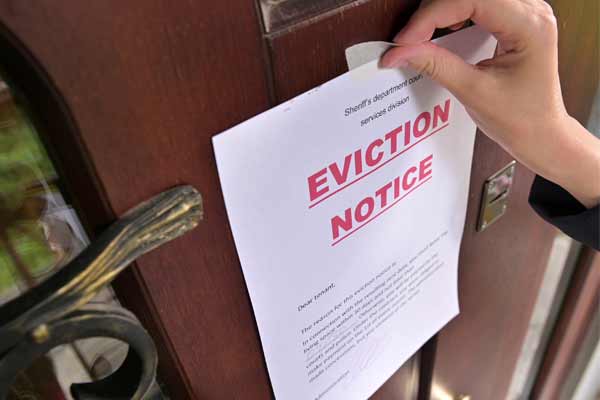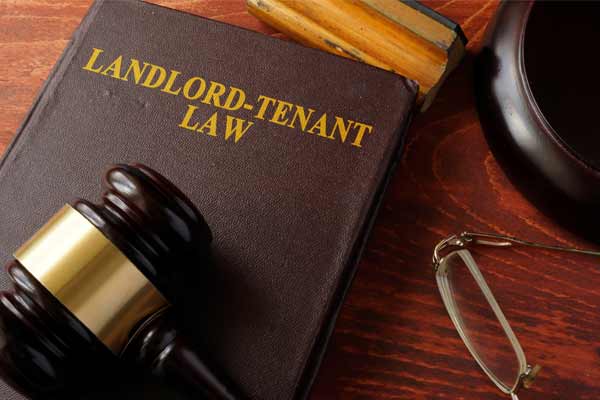Illinois follows judicial evictions, so even though a tenant is violating their lease in some ways or isn’t paying rent, the landlord just can’t kick them away. A court has to order the tenant to be evicted, and it’s only the county sheriff who is allowed by law to evict a tenant or other occupant. This can be a mysterious process to property owners who are unfamiliar with evictions and landlord rights, Illinois courts, the sheriff’s duties, and the respective processes and procedures.
At Ktenas Law, our team of experienced Cook County eviction attorneys will take the time to make sure your case is handled correctly. We handle all eviction cases personally and we always keep our clients updated so they know what’s going on with their case. Call us today at (312) 756-8652, or chat with us online for a free initial consultation.
What Is the Eviction Process in Illinois?
The Illinois Code of Civil Procedure regulates evictions in Illinois, and landlords must follow these procedures when evicting tenants. A tenant can be evicted for two reasons: not paying rent on time or violating a section of the lease or rental agreement.
If the landlord wants to evict a tenant for not paying rent on time, they must give the tenant five days’ notice to pay the rent, this is known as a notice to pay rent or quit. If the tenant can’t pay rent within five days, then the landlord can file an eviction suit, also called forcible entry and detainer lawsuit in Illinois.
If a tenant is being evicted for violating a section of the lease or rental agreement, for instance, having a cat when no pets are allowed, the landlord must give the tenant ten days’ notice to vacate the rental unit. If the tenant doesn’t vacate the property within ten days, then the landlord can now file an eviction lawsuit.

The landlord has to file the eviction suit, or forcible entry, or detainer suit, in the county’s court where the rental units are located. Then the tenant will receive a copy of the lawsuit and a summons from the court with a hearing date for the eviction suit. If the tenant wishes to fight the eviction, they must appear at the court hearing, and they must file their response before the hearing date.
However, under Illinois law, the tenant doesn’t have to file an answer. The tenant needs to only tell the court their defense during the eviction hearing. The court will then make a final decision regarding the legality of the eviction and if the tenant has to move out of the rental unit.
How Do I Serve an Eviction Notice in Chicago?
The most important step in every eviction is serving the eviction notice. The Eviction Act guides landlords on the right way to serve an eviction notice. Unless there’s no one living in the rental unit, there are three acceptable ways to serve an eviction notice:
- By personal service, which means you must hand the notice personally to the tenant. This excludes tapping the notice to the door, sliding the notice under the tenant’s door, or leaving the notice on the mailbox.
- Abode or substitute service, which means you must hand the notice personally to someone who is a member of the tenant’s household who is 13 years old or older, and
- By certified mail. Here, you must request the return receipt. Although certified mail may seem like the best option, it requires an actual return of the “green card”--the return receipt for the certified mail. The tenant must sign the green card themselves. Because it’s possible for the tenant and their family to avoid the mailman, or even refuse to sign a certified mail piece, this is not the best way to serve an eviction notice.
- Another way to serve the eviction notice is only allowed if no one is living on the property, and it’s service by posting. This service method involves tapping or affixing the notice to the rental unit, usually at the front door. This may seem like the best way to serve an eviction notice without needing the tenant’s presence. However, it’s crucial to note that this method is only allowed when no one is living on the property. This doesn’t mean you can use this method when the tenant isn’t home, on a vacation, or out for work. Although Illinois law is somewhat fluid because the Illinois supreme court hasn’t issued a decision on it, the prevailing way trial judges can apply the law based on recent appellate court decisions is strict. This means if you break service rules about serving eviction notices, your case might be dismissed, and you’ll have to start all over again because you didn’t complete the process properly.
If My Tenant's Lease has Expired, Can I Change the Locks and Move All of their Belongings out of My Rental Unit?
No, you can’t, only a court order discharged by the County Sheriff can restore your possession of the property. Under Illinois judicial evictions, even though a tenant hasn’t moved out of your rental unit when they should have, you can’t just throw them out or their belongings and change the locks. This is called “self-help,” and it’s unlawful. Even if the lease has expired, a court has to order that the tenant is evicted, and according to the law, only the county sheriff can evict a tenant.
My Tenant Told Me I Can’t Evict Her Because She has Minor Children. Is that true?
No, age, disability, or sickness aren’t defenses to the eviction, so is having children. Sometimes, a judge may allow tenants more time to move out if they have minor children, however, this is usually a slight delay.
When Should a Landlord Hire an Attorney?
Most landlords who own or manage rental properties likely have an attorney on staff or even on “retainer.” However, you don’t need to consult regularly with a Chicago real estate lawyer; you need to recognize situations that call for legal help. Here are scenarios when a landlord can benefit from legal professional help:
Evicting a Tenant
In Illinois, an eviction lawsuit takes less time than regular civil cases. But for expedited treatment, landlords must adhere to highly detailed regulations, from notifying tenants of the lawsuit to filing the right documents. Further, because it’s the tenant’s home that's at stake, many courts set the bar high when ruling in the landlord’s favor. Thus, winning an eviction lawsuit is a daunting task.

Hiring an attorney is in your best interests if:
- It’s your first eviction
- The tenant is objecting to the eviction and has hired an attorney already
- The tenant is an employee who you’re firing
- The tenant is filing for bankruptcy
- You must comply with the housing program or rent control rules for eviction.
Being Sued or Investigated for Illegal Discrimination
You don’t need an attorney every time a tenant or prospect accuses you of illegal discrimination. However, even landlords who diligently comply with fair housing regulations may still get these accusations from tenants they evict or prospects they reject for legitimate business reasons. If a tenant or prospect sues you for discrimination or if a fair housing agency or HUD agrees to investigate a claim, it’s good to consult an attorney.
Being Sued for Illness or Injury
If a guest or tenant claims or sues you because they got hurt or sick because of your negligence, you should hire a Cook County injury attorney to defend you. Typically, personal injury cases are high stakes, and Chicago personal injury attorneys know how to defend their clients through these cases. Besides, you may find it hard to confront a tenant who has suffered serious loss, even though you believe you shouldn’t be held liable.
A Chicago eviction attorney will be emotionally detached from the case and has the skills to negotiate in these types of situations. Luckily, if you have liability insurance and pay your premiums, your insurer will provide you with a lawyer to defend you against personal injury lawsuits.
Being Sued for Significant Property Damage
Also, tenants can sue you if they feel that your failure to maintain the property caused damage to their property. In such situations, your insurance liability policy should kick in. If the claim is high, you may opt to refer the issue to your insurer and leverage their obligation to provide you with a lawyer. However, if the claim is low, and it’s being handled in small courts, you may want to handle it yourself, but you can still benefit from an hour or two of coaching sessions from an experienced property damage attorney.
Contact Our Chicago Eviction Attorney Today!
At Ktenas Law, we have worked extensively with commercial and residential property owners throughout Chicago. When you hire us to safeguard your landlord rights, we’ll devote our attention to every aspect of your eviction case. We understand how crucial it is to communicate with your lawyer, and we work hard to respond promptly to your calls and emails.
Call us today at (312) 756-8652, or chat with us online to schedule your free initial consultation.

